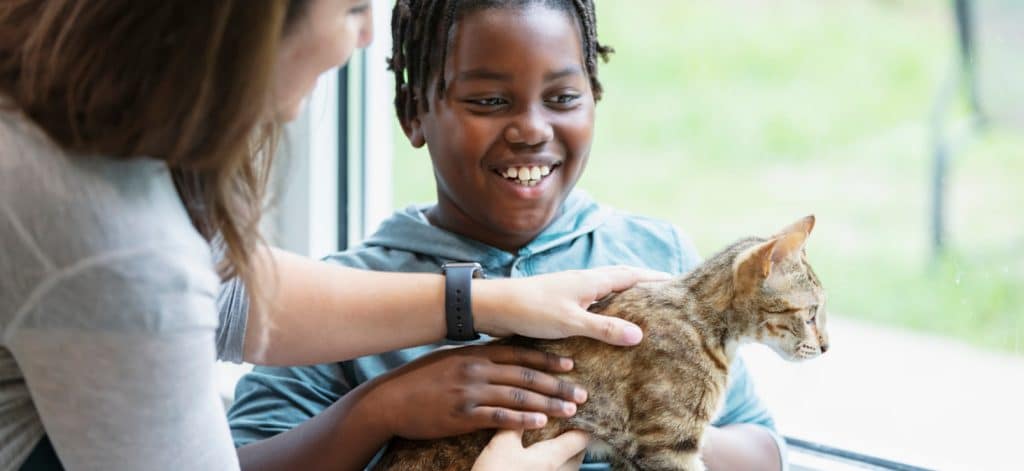Pet ownership can bring joy and happiness to any home. For children with sensory processing disorder, autism, ADHD, and social or behavioral issues, adopting a domesticated pet can provide wonderful benefits. Here are some great reasons to consider adding a pet to your family.
Helps Grow Social Skills
Kids who spend time playing with a pet typically enjoy interacting with people more than kids who don’t own a pet. They also learn to develop skills such as interpreting nonverbal cues and trust. Owning a pet can also encourage empathy towards animals and humans alike.
Lower Stress
Having a furry friend to play with, pet, and cuddle can lower stress and elevate mood. Stroking a pet’s soft fur can have a calming effect on people. “When my daughter is crying, our cat will come running and snuggle up to her,” says Katlyn Purkapile, Edgerton mom of three. “It has been amazing to see the change it has made with her. My daughter starts petting her and calms down quicker than any other techniques we have tried. It’s a really special relationship.” Per a study done by Frontiers in Psychology, people who spend time with a pet on a regular basis have lower blood pressure, lower heart rate, and less stress. Patients that were visited by a service animal while in the hospital also reported less pain.
Helps Develop Life Skills
Kids who have the opportunity to care for a pet will also develop important life skills such as time management, responsibility, and understanding the importance of a schedule for feeding, walking, and cleaning their pet.
Stability
Kids who crave stability and routine will benefit from having a pet in their lives. Pets can provide a different type of stability that they may not get from peers or family members. “My 8-year-old has ADHD. We recently got him a kitten, and he sits still and is calm with her for long periods of time,” says Olathe mom, Pricella Edwards. “I believe it helps him.”
Promotes Learning
Many parents have found that having their pet near them during virtual learning or while doing homework helps the child stay calm and focused. “My 11-year-old has anxiety and depression. For her birthday she received a guinea pig. Lilly, the guinea pig, has been a game changer,” says Tiffany Nolan, mom of five. “Virtual schooling was especially difficult for her. Suggesting she snuggle Lilly will dramatically improve her mood and demeanor. For her (and for us) it has had a huge positive impact.”
Pets are a great addition to any family but can be a huge help to kids with special needs. Before adopting a pet, consider what type of animal would best fit your lifestyle, space, and budget. “It’s important to do your research and get a pet that will work for your family,” says Becky Smith, Olathe mom. “I was very careful about getting an older cat with a calm demeanor to best get along with my kids.” Ask your child for their input and let them help choose what type of pet they would like to join the family. Chances are your new pet will have a positive impact on everyone in your household.
Important Things to Consider Before Adopting a Pet
Cost: Pet ownership can be expensive. Before adopting an animal, research the cost of purchasing the animal, vet bills, food, and any other items needed. Depending on the type of animal, the cost could go on for many years.
Space: It’s important to choose a pet that is a good fit for your home and yard size. If you are renting, check to make sure your property owner allows pets.
Care: Determine who will be responsible for your pet. Some children may not be able to clean up after or manage some of their pet’s needs. Who will be responsible? Are you willing to commit to this for the lifespan of the pet?
Attention: What does your child’s schedule look like? Does your child have time to give the attention the pet deserves? Are you home enough to walk a dog? Do you travel often? Who would take care of the animal while you are at work, school, or on vacation?
Noise: Some kids may have sensitivity to loud noises. If this is the case, you may not want to adopt a dog that barks loudly. If your child is a light sleeper, you may not want to have a nocturnal animal’s cage in their room at night.
With these things in mind, it will be easier to determine which animal would be the best fit for your family.
Check out the full March issue below!




